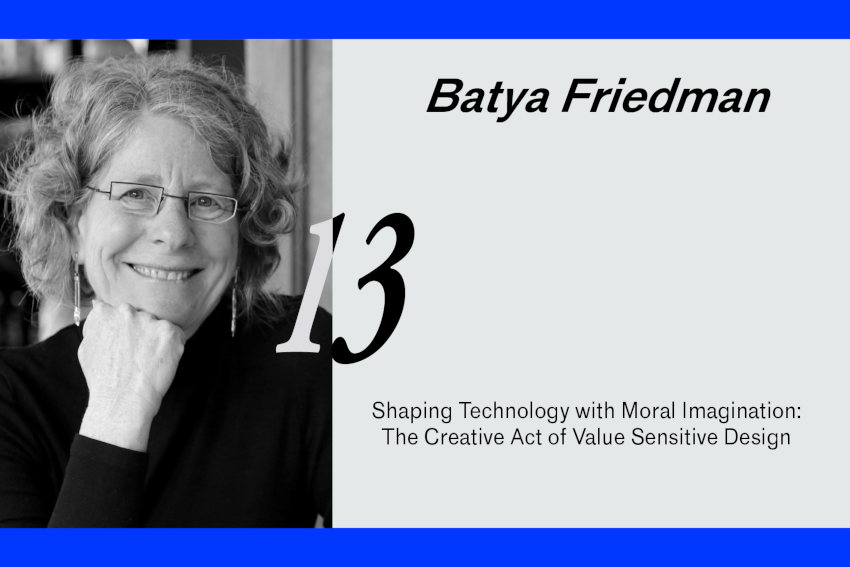Notícias
Creativity Talks Batya Friedman | Shaping Technology with Moral Imagination: The Creative Act of Value Sensitive Design
February 22 | 6 pm | On line via Youtube

The thirteenth session of the Creativity Talks will have as keynote speaker the distinguished University of Washington Professor and value sensitive design pioneer Batya Friedman on Shaping Technology with Moral Imagination: The Creative Act of Value Sensitive Design. The session will be online via YouTube on February 22, 2024, at 6 pm GMT (Lisbon and London time). Eliana Santiago, Assistant Professor at the Faculty of Fine Arts of the University of Porto, will moderate the session.
Tools and technologies are fundamental to the human condition. They do no less than create and structure the conditions in which we live, express ourselves, enact society, and experience what it means to be human. They are also the result of our moral and technical imaginations. Yet, with our limited view, it is not at all obvious how to design and engineer tools and technology so that they are more likely to support the actions, relationships, institutions, and experiences that human beings care deeply about – a life and society of human flourishing.
Value Sensitive Design (VSD) was developed as an approach to address this challenge from within creative technical design processes. Drawing on over three decades of work, in this talk I will provide an introduction to value sensitive design foregrounding human values in the technical design process. My remarks will present some of value sensitive design’s core theoretical constructs. Along the way, I’ll provide some examples of creatively applying value sensitive design to robots for healthcare and to bias in computing systems as well as demonstrate one toolkit—The Envisioning Cards—in the context of a design activity.
As time permits, I will turn to a discussion of structure, scale and time: we act within existing structure in the now, from which futures unfold across time and scale. I will unpack these observations and their implications for artificial intelligence, machine learning technologies, and the environment. Thinking longer-term and systemically, I will bring forward a range of potential challenges and offer some constructive ways forward. My comments will engage individual lives, society writ large, what it means to be human, the planet and beyond. For those online, please have scratch paper and a pencil handy for the design activity.
Promoted by the Department of Computer Engineering of the Faculty of Engineering of the University of Porto (FEUP), "CreativityTalks" is a forum on multidisciplinary creative thinking processes, with a view to innovation and new teaching methodologies.
Batya Friedman is a Professor in the Information School and holds adjunct appointments in the Paul G. Allen School of Computer Science & Engineering, the School of Law, and the Department of Human Centered Design and Engineering at the University of Washington where she co-founded the Value Sensitive Design Lab and the UW Tech Policy Lab. At the heart of Dr. Friedman’s work lies a fascination with cultivating moral and technical imagination. Dr. Friedman pioneered value sensitive design (VSD), an approach to account for human values in the design of technical systems. Over the course of three decades, her work in value sensitive design has resulted in robust theoretical constructs, dozens of innovative methods, and practical toolkits such as the Envisioning Cards. Value sensitive design has had wide appeal globally where it has been used in architecture, biomedical health informatics, civil engineering, computer security, energy, global health, human-computer interaction, human-robotic interaction, information management, legal theory, moral philosophy, tech policy, transportation, and urban planning, among other fields. Additionally, value sensitive design is emerging in higher education, government, and industry as a key approach to address computing ethics and responsible innovation. Today, Dr. Friedman is working on open questions in value sensitive design including multi-lifespan design, and designing for and with non-human stakeholders – questions critical for the wellbeing of human societies and the planet.
Please watch the session on YouTube here.
::::::::::::::::::::::::::::::::::::::::::::::::::::::::::::::::::::::::::
Divulgue os seus eventos e projetos através do e-mail: noticias@fe.up.pt. Saiba mais sobre os nossos serviços no site dos SICC.
Página gerada em: 2024-11-08 às 21:39:30 | Política de Utilização Aceitável | Política de Proteção de Dados Pessoais | Denúncias